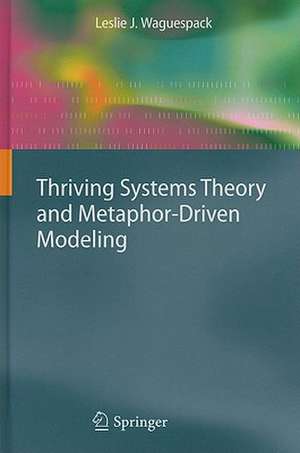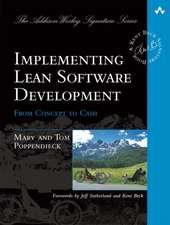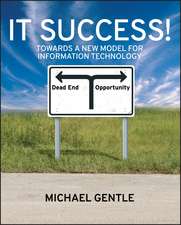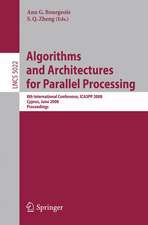Thriving Systems Theory and Metaphor-Driven Modeling
Autor Leslie J. Waguespacken Limba Engleză Hardback – 7 oct 2010
| Toate formatele și edițiile | Preț | Express |
|---|---|---|
| Paperback (1) | 691.01 lei 6-8 săpt. | |
| SPRINGER LONDON – 28 noi 2014 | 691.01 lei 6-8 săpt. | |
| Hardback (1) | 645.97 lei 6-8 săpt. | |
| SPRINGER LONDON – 7 oct 2010 | 645.97 lei 6-8 săpt. |
Preț: 645.97 lei
Preț vechi: 807.46 lei
-20% Nou
Puncte Express: 969
Preț estimativ în valută:
123.61€ • 132.18$ • 103.06£
123.61€ • 132.18$ • 103.06£
Carte tipărită la comandă
Livrare economică 18 aprilie-02 mai
Preluare comenzi: 021 569.72.76
Specificații
ISBN-13: 9781849963015
ISBN-10: 1849963010
Pagini: 239
Ilustrații: XI, 167 p.
Dimensiuni: 155 x 235 x 20 mm
Greutate: 0.43 kg
Ediția:2010
Editura: SPRINGER LONDON
Colecția Springer
Locul publicării:London, United Kingdom
ISBN-10: 1849963010
Pagini: 239
Ilustrații: XI, 167 p.
Dimensiuni: 155 x 235 x 20 mm
Greutate: 0.43 kg
Ediția:2010
Editura: SPRINGER LONDON
Colecția Springer
Locul publicării:London, United Kingdom
Public țintă
Professional/practitionerCuprins
Thriving Systems Theory and Metaphor-Driven Modeling.- Thriving Systems Theory.- Christopher Alexander’s Nature of Order.- Wholeness and Center Properties Mapped to Modeling.- Achieving Versus Observing Strength in Choice Properties.- Building Life into Information Systems.- A Vision of Thriving Systems.- Thriving Systems Theory in Systems Development.- Metaphorology.- Metaphor-Driven Modeling.- Protecting Life in System Life Cycles.- Metaphor-Driven Systems Engineering.- Thriving Systems and Beauty.- Promoting Life Using the Object-Oriented Paradigm.- Promoting Life Using the Relational Paradigm.- Thriving Systems Through Metaphor-Driven Modeling.
Notă biografică
Dr. Waguespack is a graduate of the University of Louisiana at Lafayette (formerly USL) with degrees in Computer Systems and Software, MIS and Computer Architecture. After five years in the USAF, headquarters personnel, directorate of the computer systems, modeling branch, he taught in the Computer Science department at LSU. Since 1984 he has been teaching in the Computer Information Systems department at Bentley University - systems EAD (engineering/analysis/design), object-oriented systems EAD, software project management and database.
Textul de pe ultima copertă
How is it that one system is more effective, appealing, satisfying and/or more beautiful than another to its stakeholder community? This question drove Christopher Alexander’s fifty-year quest to explain great physical architecture and gave birth to pattern-languages for building that underpin much of modern systems engineering. How is it that so many individual stakeholders consistently recognize the same quality, the same beauty in a system? This question led George Lakoff to research the role of conceptual metaphor in human understanding. What is essential to stakeholders’ satisfaction with systems? Fred Brooks, in his publications, addressed this question. This monograph fuses these diverse streams of thought in proposing Thriving Systems Theory by translating Alexander’s properties of physical design quality into the abstract domain of information systems and modeling. Metaphor-Driven Modeling incorporates the theory while examining its impact throughout the system life cycle: modeling, design and deployment. The result is holistic and innovative, a perspective on system quality invaluable to students, practitioners and researchers of software and systems engineering.Les Waguespack is a computer science Ph.D., professor and chairperson of computer information systems at Bentley University, USA. Dr. Waguespack’s experience as programmer, software engineer, software architect, database architect, project manager and systems consultant underpins 35 years of teaching and research, the last 20+ years teaching object-oriented modeling and systems engineering to undergraduates, graduate students and practicing professionals.
Caracteristici
Integrates theories from three disciplines: physical architecture, cognitive linguistics and systems/software engineering Presents a unifying foundation explaining the interrelationships between systems and software engineering The 15 choice properties translated from Alexander’s center properties together represent the most comprehensive set of systems engineering Includes supplementary material: sn.pub/extras













